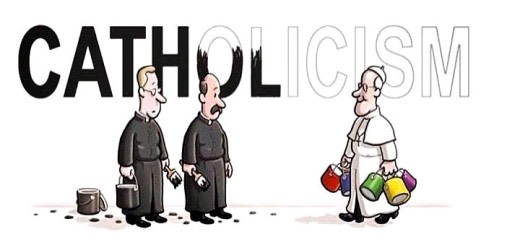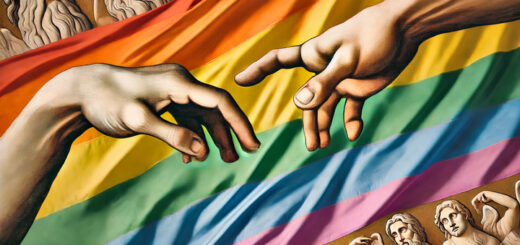Apologies are good, actions are even better. Catholics' reactions to the Pope's words
Article by Francis DeBernardo published on Bondings 2.0, blog of the Catholic association New Ways Ministry (United States), on 9 July 2016, freely translated by Giacomo Tessaro
In an article written for the Catholic site Crux Passionist priest Edward Beck expressed the sentiment common to many LGBT Catholics and their supporters after hearing Pope Francis' call for an apology to lesbians and gays: words are empty if they are not followed by actions. In another article, written for Religion News Service, the director of the Catholic association Faith in Public Life John Gehring suggests some actions that bishops can take to make the request for an apology more concrete.
In the article Saying 'sorry' to gays a good step, but change still needed Father Beck, writer and commentator, shows how Vatican documents, including statements by the Archbishop of Buenos Aires Jorge Mario Bergoglio, have repeatedly offended lesbians and gays, particularly on the topic of marriage, and points out that, despite the request of the Pope's apology, “the Church's opposition to homosexual unions and marriages remains intact”.
Apologies are about more than just words, Father Beck observes: “Apologies are a good thing. They mean that we understand that we have wronged someone and that we are sorry for the words and actions that caused the offense. […] In our Catholic tradition, however, forgiveness also depends on the commitment and effort not to cause the same offense again. In the Act of Contrition recited during the Sacrament of Reconciliation the penitent states: 'I am firmly resolved, with the help of your grace, to sin no more and to avoid the slightest occasion of sin'. […] Do we have evidence that the Church (or Pope Francis) has made this type of commitment towards homosexuals?”.
Father Beck states that this question is still open and cites the example of the Archbishop of Munich Reinhard Marx, who almost a week before the interview with the Pope not only invited the Church to apologize but did so himself. Cardinal Marx followed the actions with the words: “He went so far as to speak out against opposition to homosexual civil unions in Germany: 'We have a moral position that is clear, but the secular state must regulate these unions and bring them to an acceptable position. We as the Church cannot be against.'. […] This is an example of the concrete action that many homosexual people expect from the Catholic Church. They appreciate his recent openness but think that the true process of reconciliation and healing can only begin with a firm resolve not to persevere with discrimination and oppression, exacerbated by insensitive language and a seemingly monolithic theological perspective.”. Father Beck suggests the Church should not stop there if it wants its apology to be credible: “Many think that an authentic conciliatory practice must include an update of the Catechism and a commitment to banish rejecting and paternalistic rhetoric from all official Church documents. This would also mean supporting civil unions as a protection of human rights and privileges."
If US bishops and priests are looking for a way to apologize in a concrete way, they should take a look at the article written by John Gehring for Religion News Service, titled Will the Bishops seriously follow Pope Francis' invitation to listen to LGBT people?. Like Father Beck and others, Gehring notes how “Words are not enough to heal the wounds inflicted on many LGBT Catholic people, victims of indifference and exclusion”, but then suggests that the honesty of Pope Francis “It's a unique opportunity for Catholic clergy to start all over again.”
Gehring points out that there are many ways in which the Catholic bishops of the United States can reverse their attitude towards LGBT issues. At the top of the list is the dialogue: “The priests of the 195 Catholic dioceses in the United States could first meet and listen to gay Catholics and LGBT leaders. Disagreements would emerge, there would be room for civil debate, but such an attitude of humility and respect would send a powerful signal that America's largest Church wants to learn something from the diverse experiences of gays, lesbians and transgender people."
Defending LGBT rights, however, would send an even stronger signal: “Catholic bishops could do more than denounce discrimination in the workplace and in the real estate market. Gays and lesbians can now legally marry, but in more than half the states you can legally discriminate against a homosexual person. […] Catholics should be at the forefront in fighting these injustices. When the Senate passed a bipartisan measure to combat discrimination in the workplace in 2013, the Conference of Catholic Bishops said it wanted to "work with all politicians and people of good will to put an end to all forms of unjust discrimination," but then opposed the law because according to the bishops it would undermine marriage and endanger religious freedom. The US Catholic bishops can and must do more."
The bishops could simply convey their message in a milder manner: “The bishops should tone down the controversy and behave like pastors, not lawyers. Whether it's lambasting Obama's 2014 measure prohibiting federal contractors from discriminating on the basis of sexual orientation or gender identity (branded as "extremist") or condemning the Supreme Court ruling allowing same-sex marriage (a “tragic mistake”), the attitude of the bishops has persuaded very few people and has only rubbed salt into old wounds.”.
Gehring points out how all this can be done without changing anything in the Church's teaching. In fact, it would be a way to highlight an often overlooked part of it: “In his comments on the front pages, Francis cited the Catechism of the Catholic Church, according to which gays and lesbians “must be welcomed with respect, compassion, sensitivity” and “every sign of unjust discrimination will be avoided in their regard”. They are unambiguous words. But they will only be words on a page if the Church does not put them into practice.”. Gehring offers some great suggestions on how to follow up an apology with action. If the bishops want more ideas on how to make peace with the LGBT community, just call us at New Ways Ministry: we have tons of them.
Original text: Apologies Are Good, Actions are Better






